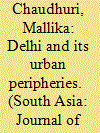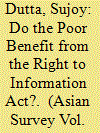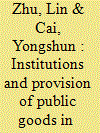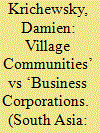| Srl | Item |
| 1 |
ID:
190724


|
|
|
|
|
| Summary/Abstract |
This paper draws on the larger experience of urbanisation in two villages in Delhi, in particular the changing political and social life of these villages. Based on field research conducted between 2017 and 2019, it aims to explore the associational life of the villages and the ways in which traditional and newer forms of association and governance interact with each other and the state. In the new landscape, where panchayats operate alongside resident welfare associations and youth-led self-help organisations, a multiplicity of ‘political’ and ‘associational’ strategies have been adopted, with the invocation of terms such as ‘social work’ alongside an older invocation of biradari or community.
|
|
|
|
|
|
|
|
|
|
|
|
|
|
|
|
| 2 |
ID:
185982


|
|
|
|
|
| Summary/Abstract |
I investigate to what extent India’s Right to Information Act is useful for poor households. Drawing on empirical data from central Uttar Pradesh, I study two categories of poor households—urban and rural—possessing Below Poverty Line cards. These cards entitle their holders to several subsidies, but they are poorly targeted: certain communities receive more cards, while most of the deserving poor do not receive them. The Act is meant to create space for democratization, enabling the poor to challenge local power holders; but there are obstacles to their taking advantage of it. They are scarcely educated, and unaware of the Act, and they get no support from government agencies responsible for implementing it. This has encouraged the use of manipulative tactics by local representatives and government bureaucrats seeking power, control, and domination. But the poor do find ways to receive their entitlements.
|
|
|
|
|
|
|
|
|
|
|
|
|
|
|
|
| 3 |
ID:
090110


|
|
|
|
|
| Publication |
2009.
|
| Summary/Abstract |
This paper investigates the impacts of financial intermediary (or banking) development on village-level per capita income using a Chinese dataset for selected years between 1993 and 2006. The empirical results from a random effect regression model indicate that mean per capita income in rural villages follows an inverted U-shaped path as financial intermediation develops. However, using a pooled quantile regression approach, we find that median per capita income in rural villages follows a positive linear path, rather than an inverted U-shaped path, as financial intermediation develops. The positive linear effect of financial intermediary development is observed at the lower and higher ends of the conditional per capita income distribution. This suggests that development of financial intermediation in China might not have statistically significant differential effects in low-income or high-income rural villages.
|
|
|
|
|
|
|
|
|
|
|
|
|
|
|
|
| 4 |
ID:
145789


|
|
|
|
|
| Summary/Abstract |
In societies where formal institutions are absent or weak, informal institutions
are found to serve as mechanisms that enhance government
accountability. Pertinent research on China has come up with similar
findings. But two issues have not been adequately addressed in existing
research. One is the relationship between formal and informal institutions
in shaping government behavior if both types of institutions exist.
The other is the factors that affect the (re)emergence of informal institutions.
Based on a survey of about 800 villages in Guangdong province,
this article shows that the existence of both formal and informal institutions
may enhance government accountability in the provision of public
goods. Factors such as community history and practical needs
contribute to the (re)emergence of informal institutions.
|
|
|
|
|
|
|
|
|
|
|
|
|
|
|
|
| 5 |
ID:
177192


|
|
|
|
|
| Summary/Abstract |
India’s current ‘pro-business’ development regime has been both challenged by depictions of malevolent corporations oppressing helpless village communities and legitimised by depictions of socially responsible corporations ‘developing’ grateful backward communities. To overcome these contradictory narratives, which fail to account for the intricate relationships between villagers and corporate actors, the article analyses how these narratives are constructed in interaction with local conflicts surrounding industrial activity. Guided by a framework based on social systems theory, a detailed study of two cement plants located in Chhattisgarh shows how this interaction operates through multiple discursive layers, which vary in terms of their degree of specification/generalisation and concreteness/abstraction.
|
|
|
|
|
|
|
|
|
|
|
|
|
|
|
|